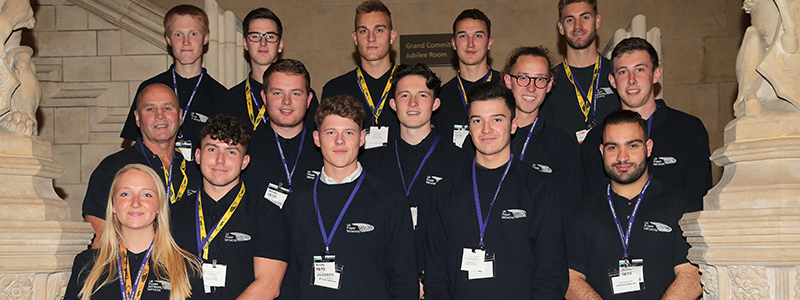Published on: October 17, 2017 at 2:02 PM
We Celebrate Passing 100 Apprentices

The Energy & Utilities Independent Assessment Service (EUIAS) has recently passed the 100 mark of achievers that have completed their apprenticeships through its end-point assessment service, becoming the first in the energy and utilities sector to reach this mark under the new Apprenticeship Standards in England. With the number of achievers now standing at over 160, the milestone was celebrated at a special event at the House of Lords recently.
The event was hosted by Lord Aberdare, Vice Chair of the All Party Parliamentary Group for Apprenticeships and included special addresses from Philip Edmeades, Policy Lead, Apprenticeships at Department for Education, Nick Ellins Chief Executive of Energy & Utility Skills and CEO of UK Power Networks, Basil Scarsella, who is also Chair of the Energy & Utilities Skills Partnership, who said: “Our employees are the life blood of our business, and our apprentices are, and will be, vital contributors. They have worked hard to meet the high standards which we require and have acquired the skills necessary to deliver a first class service to our customers in a safe, reliable and efficient way.
“To meet the country’s future needs the Skills Strategy, launched this year through the Energy and Utilities Skills Partnership, involving 28 energy and utility companies, is raising the profile of job opportunities in the power, gas, water and waste management sectors. At UK Power Networks we are continuing to invest in apprenticeships and over the last three months we have recruited 39 apprentices who can look forward to an exciting career with a successful company in a sector which provides essential services to the entire UK population.”
The invited guests in attendance also included Cameron Rae, Senior Policy Advisor at BEIS Industrial Strategy Unit and Peter Bingham, Chief Engineer at Ofgem.
Mick Shannon of UK Power Networks, the first apprentice on the Power Networks Craftsperson apprenticeship to pass end-point assessment through the EUIAS, also attended, alongside the 100th, Connor Watkins, plus a number from the current cohort of former UK Power Networks’ apprentices, who have all graduated to permanent roles. Shannon was also the first achiever in any sector on the new English Standards. UK Power Networks, the UK’s largest power distributor, serves over eight million homes and businesses across London, South East and East England. It has trained over 250 apprentices since 2012.
Dr Jacqueline Hall, the EUIAS’ Associate Director, also gave an address. She said: “The EUIAS was established to provide rigorous end-point assessment for apprentices completing the new English Standards, ensuring that apprentices have the knowledge, skills and behaviours needed to be fully competent in our safety-critical industries.”
The EUIAS was established in 2014 after consultation with employers to deliver rigorous and robust apprenticeship end-point assessment services specifically to the energy and utilities sector. Employers in the sector have developed 11 new ‘Trailblazer’ standards in England across gas, water, power and waste, with the EUIAS providing end-point assessment for nine of those standards and the graduates from each helping to address skills shortages.
The EUIAS delivered end-point assessment services for the first achiever and the first female engineer achiever at level 2 on the English apprenticeship standards. These apprentices have also proceeded to permanent employment. The level 2 apprenticeship is a one-year course, combining theoretical study with on-the-job learning. There is a current shortage of essential overhead lines occupations that the achievers on the Power Networks Craftsperson programme could help fill.
The energy and utilities workforce recruitment challenges are well documented. Sector employers continue to find it difficult to recruit for technical vacancies. The 2015 Employer Skills Survey found that 36% of sector vacancies are proving hard to fill due to a lack of skilled applicants. This is the highest percentage across all sectors in the UK; the average is 23%. The National Skills Academy for Power predicts that 18,700 appointments are required by the power sector over the next six and a half years. Over half of these will need to be recruited through apprenticeships and other talent sources.
The Workforce Renewal and Skills Strategy, the first-ever coherent strategic plan for the sector, found that that the sector will need to fill over 221,000 vacancies by 2027. The sector accounts for 56% of the National Infrastructure Pipeline, which underpins the UK economy.
Nick Ellins added: “These statistics demonstrate that the provision of rigorous end-point assessment has an important role to play in support the skills agenda by maximising investment in skills and addressing skills gaps and shortages, to ensure sector workforce resilience. Our continued work with employers will ensure that quality assurance remains at the highest standard to ensure every apprentice is work-ready, safe, skilled and competent.
“We enjoyed acknowledging the EUIAS’ milestone, UKPN’s continued apprenticeship success and their graduates for applying themselves to their learning, along with some of the key stakeholders that have made this possible.”
End-point assessment allows an apprentice to demonstrate the knowledge, skills and behaviours, as defined in the published apprenticeship standard, so that they can complete and achieve their apprenticeship.
It is taken by apprentices at the very end of the on-programme phase of training when their employer (and in some cases their training provider) is satisfied that they have met the “gateway” criteria to undertake the assessment.
An independent organisation must be selected by an employer to carry out the end-point assessment of each apprentice, to ensure apprentices are assessed consistently and comparably. End-point assessment is graded as defined in the published assessment plan. An apprenticeship certificate is only awarded after end-point assessment is successfully completed.